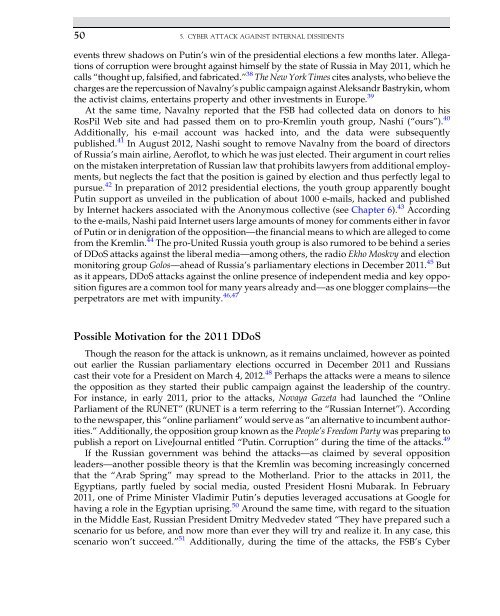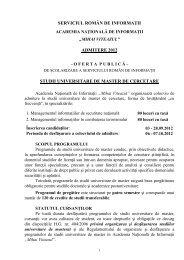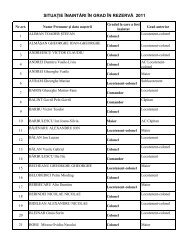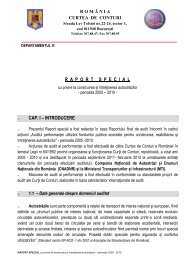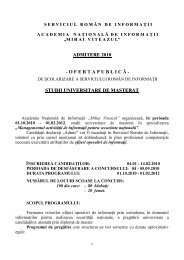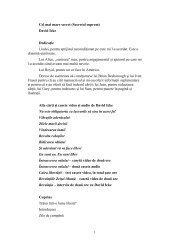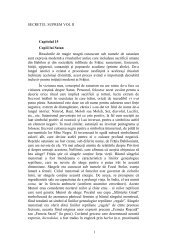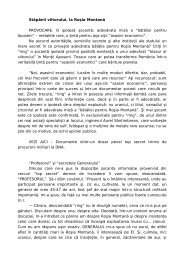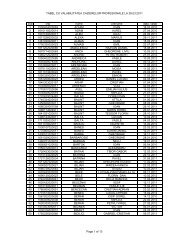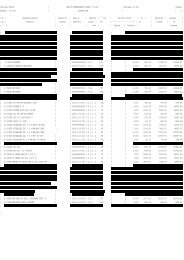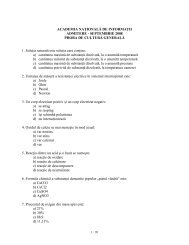Introduction to Cyber-Warfare - Proiect SEMPER FIDELIS
Introduction to Cyber-Warfare - Proiect SEMPER FIDELIS
Introduction to Cyber-Warfare - Proiect SEMPER FIDELIS
Create successful ePaper yourself
Turn your PDF publications into a flip-book with our unique Google optimized e-Paper software.
50 5. CYBER ATTACK AGAINST INTERNAL DISSIDENTSevents threw shadows on Putin’s win of the presidential elections a few months later. Allegationsof corruption were brought against himself by the state of Russia in May 2011, which hecalls “thought up, falsified, and fabricated.” 38 The New York Times cites analysts, who believe thecharges are the repercussion of Navalny’s public campaign against Aleksandr Bastrykin, whomthe activist claims, entertains property and other investments in Europe. 39At the same time, Navalny reported that the FSB had collected data on donors <strong>to</strong> hisRosPil Web site and had passed them on <strong>to</strong> pro-Kremlin youth group, Nashi (“ours”). 40Additionally, his e-mail account was hacked in<strong>to</strong>, and the data were subsequentlypublished. 41 In August 2012, Nashi sought <strong>to</strong> remove Navalny from the board of direc<strong>to</strong>rsof Russia’s main airline, Aeroflot, <strong>to</strong> which he was just elected. Their argument in court relieson the mistaken interpretation of Russian law that prohibits lawyers from additional employments,but neglects the fact that the position is gained by election and thus perfectly legal <strong>to</strong>pursue. 42 In preparation of 2012 presidential elections, the youth group apparently boughtPutin support as unveiled in the publication of about 1000 e-mails, hacked and publishedby Internet hackers associated with the Anonymous collective (see Chapter 6). 43 According<strong>to</strong> the e-mails, Nashi paid Internet users large amounts of money for comments either in favorof Putin or in denigration of the opposition—the financial means <strong>to</strong> which are alleged <strong>to</strong> comefrom the Kremlin. 44 The pro-United Russia youth group is also rumored <strong>to</strong> be behind a seriesof DDoS attacks against the liberal media—among others, the radio Ekho Moskvy and electionmoni<strong>to</strong>ring group Golos—ahead of Russia’s parliamentary elections in December 2011. 45 Butas it appears, DDoS attacks against the online presence of independent media and key oppositionfigures are a common <strong>to</strong>ol for many years already and—as one blogger complains—theperpetra<strong>to</strong>rs are met with impunity. 46,47Possible Motivation for the 2011 DDoSThough the reason for the attack is unknown, as it remains unclaimed, however as pointedout earlier the Russian parliamentary elections occurred in December 2011 and Russianscast their vote for a President on March 4, 2012. 48 Perhaps the attacks were a means <strong>to</strong> silencethe opposition as they started their public campaign against the leadership of the country.For instance, in early 2011, prior <strong>to</strong> the attacks, Novaya Gazeta had launched the “OnlineParliament of the RUNET” (RUNET is a term referring <strong>to</strong> the “Russian Internet”). According<strong>to</strong> the newspaper, this “online parliament” would serve as “an alternative <strong>to</strong> incumbent authorities.”Additionally, the opposition group known as the People’s Freedom Party was preparing <strong>to</strong>publish a report on LiveJournal entitled “Putin. Corruption” during the time of the attacks. 49If the Russian government was behind the attacks—as claimed by several oppositionleaders—another possible theory is that the Kremlin was becoming increasingly concernedthat the “Arab Spring” may spread <strong>to</strong> the Motherland. Prior <strong>to</strong> the attacks in 2011, theEgyptians, partly fueled by social media, ousted President Hosni Mubarak. In February2011, one of Prime Minister Vladimir Putin’s deputies leveraged accusations at Google forhaving a role in the Egyptian uprising. 50 Around the same time, with regard <strong>to</strong> the situationin the Middle East, Russian President Dmitry Medvedev stated “They have prepared such ascenario for us before, and now more than ever they will try and realize it. In any case, thisscenario won’t succeed.” 51 Additionally, during the time of the attacks, the FSB’s <strong>Cyber</strong>


